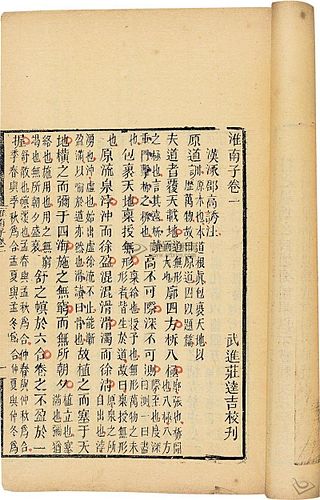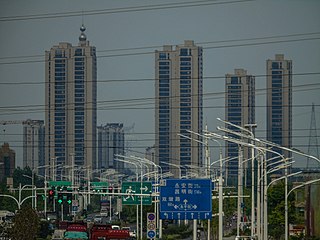Huainan United University is a university based in Huainan, Anhui, China.
Huainan United University is a university based in Huainan, Anhui, China.
The Eight Gentlemen of Huainan were the eight scholars under the patronage of Liu An, the prince of Huainan during the Western Han dynasty. Together, they wrote the philosophical collection Huainanzi.

Huainan is a prefecture-level city with 3,033,528 inhabitants as of the 2020 census in north-central Anhui province, China. It is named for the Han-era Principality of Huainan. It borders the provincial capital of Hefei to the south, Lu'an to the southwest, Fuyang to the west, Bozhou to the northwest, Bengbu to the northeast and Chuzhou to the east. Huainan is one of the core cities of Hefei Metropolitan Circle and is known for its coal industry and thermal power plants. Its built-up area made of 4 urban districts and Fengtai County largely being urbanized, was home to 1,868,944 inhabitants as of 2020. Its city flower is the Chinese rose and its city tree is the Old-World Plane Tree. It is also considered to be the hometown and birthplace of tofu.
Liú Ān was a Chinese cartographer, monarch, and philosopher. A Han dynasty Chinese prince, ruling the Huainan Kingdom, and an advisor to his nephew, Emperor Wu of Han (武帝). He is best known for editing the Huainanzi compendium of Daoist, Confucianist, and Legalist teachings and is credited for inventing tofu. Early texts represent Liu An in three ways: the "author-editor of a respected philosophical symposium", the "bumbling rebel who took his life to avoid arrest", and the successful Daoist adept who transformed into a xian and "rose into the air to escape prosecution for trumped-up charges of treason and flew to eternal life."

Lu'an, is a prefecture-level city in western Anhui province, People's Republic of China, bordering Henan to the northwest and Hubei to the southwest. As of the 2020 census, it had a total population of 4,393,699 inhabitants whom 1,752,537 lived in the built-up area made of Yu'an and Jin'an urban districts. Neighbouring prefecture-level cities are the provincial capital of Hefei to the east, Anqing to the south, Huanggang (Hubei) and Xinyang (Henan) to the west, and Huainan and Fuyang to the north. Although the character 六 is normally pronounced "Liù", in this case it changes to "Lù" on account of the historical literary reading.

The Huainanzi is an ancient Chinese text consisting of a collection of essays resulting from a series of scholarly debates held at the court of Liu An, Prince of Huainan before 139 BCE. Compiled as a handbook for an enlightened sovereign and his court, the work attempts to define the conditions for a perfect socio-political order, derived mainly from a perfect ruler. Including Chinese folk theories of yin and yang and Wu Xing, the Huainanzi draws on Taoist, Legalist, Confucian, and Mohist concepts, but subverts the latter three in favor of a less active ruler, as prominent in the early Han dynasty before the Emperor Wu. The work is notable as a primary evidence of Zhuangzi influence in the Han.

Luanchuanraptor is a genus of dromaeosaurid theropod dinosaurs from the Late Cretaceous of China. The genus is based on a partial skeleton from the Qiupa Formation in Luanchuan, Henan. They were medium-sized dromaeosaurids, the first Asian dromaeosaurid taxa described from outside the Gobi Desert or northeastern China.

Bengshan is a district of the city of Bengbu, Anhui Province, China.
Yuhui District is a district of the city of Bengbu, Anhui Province, China.

Huaishang is a district of the city of Bengbu, Anhui Province, China.

Fengtai County is a county in the north of Anhui Province, China. It is under the administration of Huainan city. Author Li Hengrui (李恒瑞), whose work "Kite Capriccio" (風箏暢想曲) describes life as a child in the 1950s in Fengtai County is included in the Putonghua Proficiency Test.
Bagongshan is a district of the city of Huainan, Anhui Province, China.
Mingguang, formerly Jiashan County, is a county-level city in the northeast of Anhui Province, China, bordering Jiangsu province to the northeast and east. It is under the administration of Chuzhou city.

Dingyuan County is a county of Anhui Province, China. It is under the administration of Chuzhou city.
Bengbu Airport is a dual-use airport in Bengbu, Anhui Province, China.

The Hefei railway station is a major railway station in Hefei, Anhui, China.
Gudian Township is a township-level division situated in Huainan, Anhui, China.
Yang Zhenchao is a former Chinese politician, who served as Vice Governor of Anhui and Chinese Communist Party Committee Secretary of Huainan. He was dismissed from his position in May 2016 for investigation by the Central Commission for Discipline Inspection.
Huainan South railway station is a railway station on the Shangqiu–Hangzhou high-speed railway in Tianjia'an District, Huainan, Anhui, China. Opened on 1 December 2019, it is the third railway station in the city.

Huainan railway station is a second-class railway station on the Huainan railway and Fuyang–Huainan railway located in Tianjia'an District, Huainan, Anhui, China. The total area of the station is 3882 square meters. Huainan railway station was completed in November 1949 and put into operation in December.
Datong is a subdistrict and seat of Datong District, Huainan, Anhui. As of 1997, Datong covers 11 square kilometers and has a population of 30,000. Datong is divided into Yuanwang Community, Zhanhou Community, Jubei Community, Junan Community, and Kuangnan Community.
32°38′41″N117°00′36″E / 32.6448°N 117.0100°E